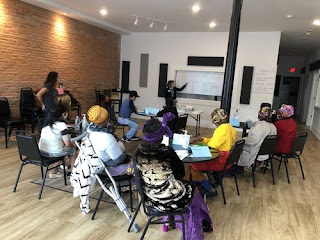There is so much to share in life. But there is supposed to be fellowship, or relationship, in sharing. And sharing, as Christians, isn't supposed to be a mandatory percentage of what we have. But we're supposed to live, and to give as we feel led or called upon to give — not under compulsion nor coercion, the Bible says, but out of the hope we have in Jesus.
No matter what we've received in order to live, our giving has to be heartfelt and appropriate and not contrary to our own well-being. Our giving isn't meant to meet socialistic expectations and doesn't need to cause us suffering, but needs to answer our individual willingness to be loving (in Jesus) even toward someone who has hurt us.
When the Bible says we've freely received and are blessed to freely give, the meaning is most of all about spiritual giving: sharing God's word. When Jesus broke bread on a mountaintop, no one was expecting that act of friendship. The mass of people on the mountaintop that day, had only wanted to hear what Jesus would say. But He felt Heaven's leading, and asked everyone to be seated for an unexpected meal together. That was Heaven's heartfelt offering of Christian friendship. Jesus added a fellowship or friendship meal to the sermon or instructions He had given them.
And He added no sorrow to the meal.
To keep us safe from the perils of public meddling, probably most of what we do on our Christian walk, isn't meant to be seen or widely known. Jesus says, "Watch out! Don’t do your good deeds publicly, to be admired by others, for you will lose the reward from your Father in heaven. When you give to someone in need, don’t do as the hypocrites do — blowing trumpets in the synagogues and streets to call attention to their acts of charity! I tell you the truth, they have received all the reward they will ever get. But when you give to someone in need, don’t let your left hand know what your right hand is doing. Give your gifts in private ... ." Matthew 6:1-4, New Living Translation
There should never be public backlash for what we do from the heart. What we do, no matter how small, shouldn't cause us to be mocked or persecuted or criticized. Indeed, in the Lord, what we do usually isn't about sharing everything we have, like some families who live together, but is usually about showing someone Christian love, or kindness — and helping someone understand what to do when they need help.
As an old song says, "If it had not been for the Lord on my side, where would I be?"










